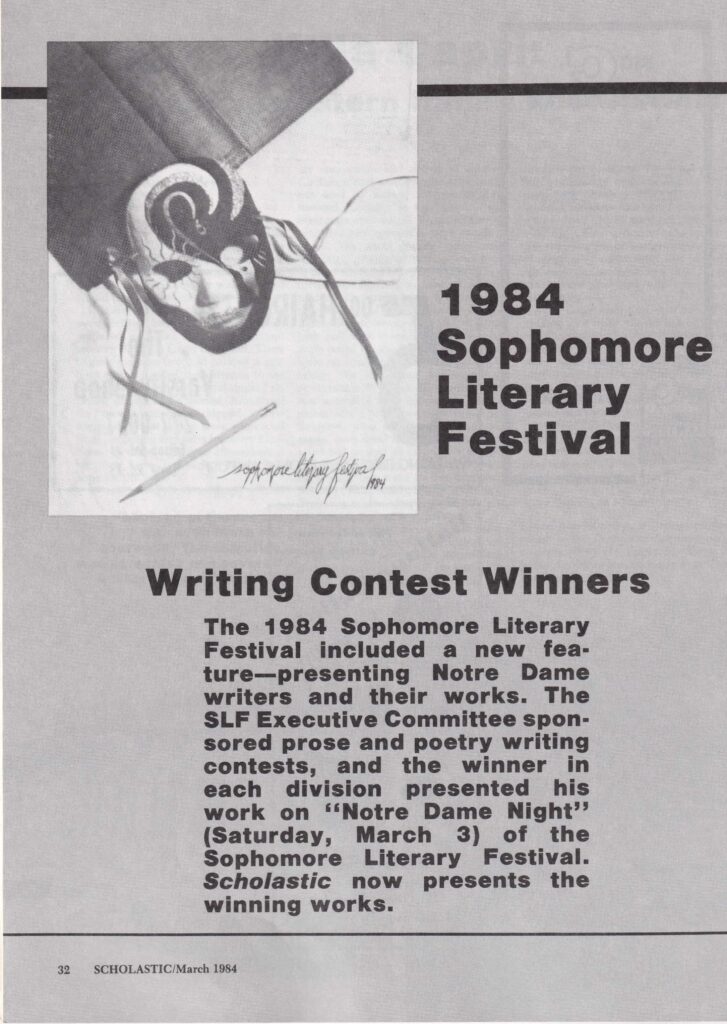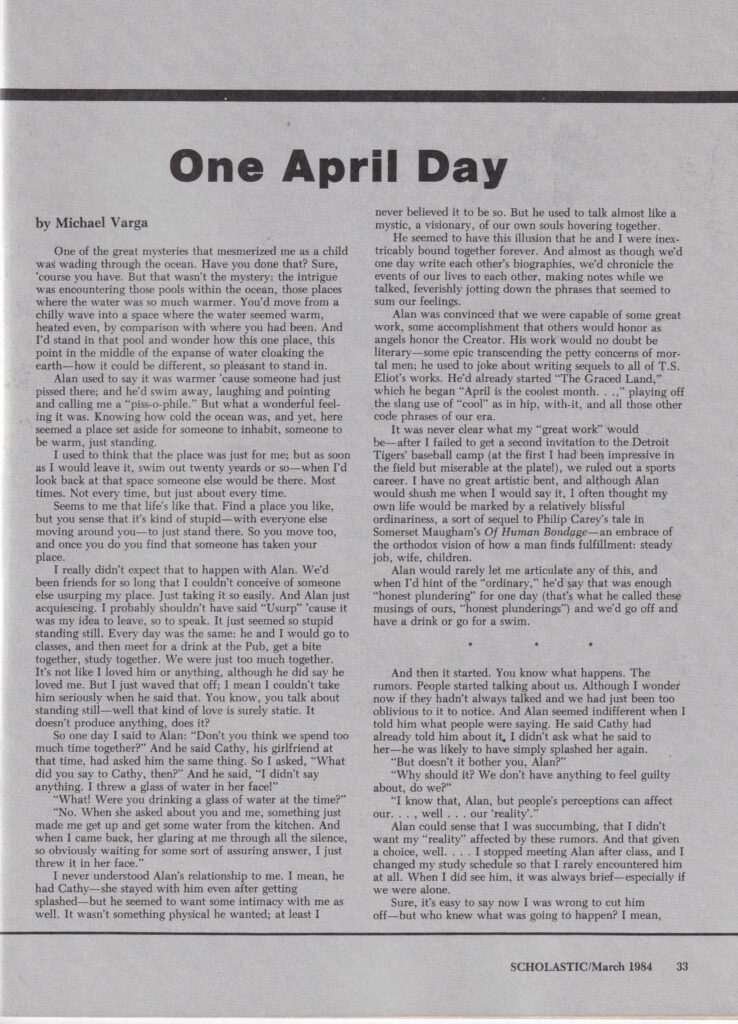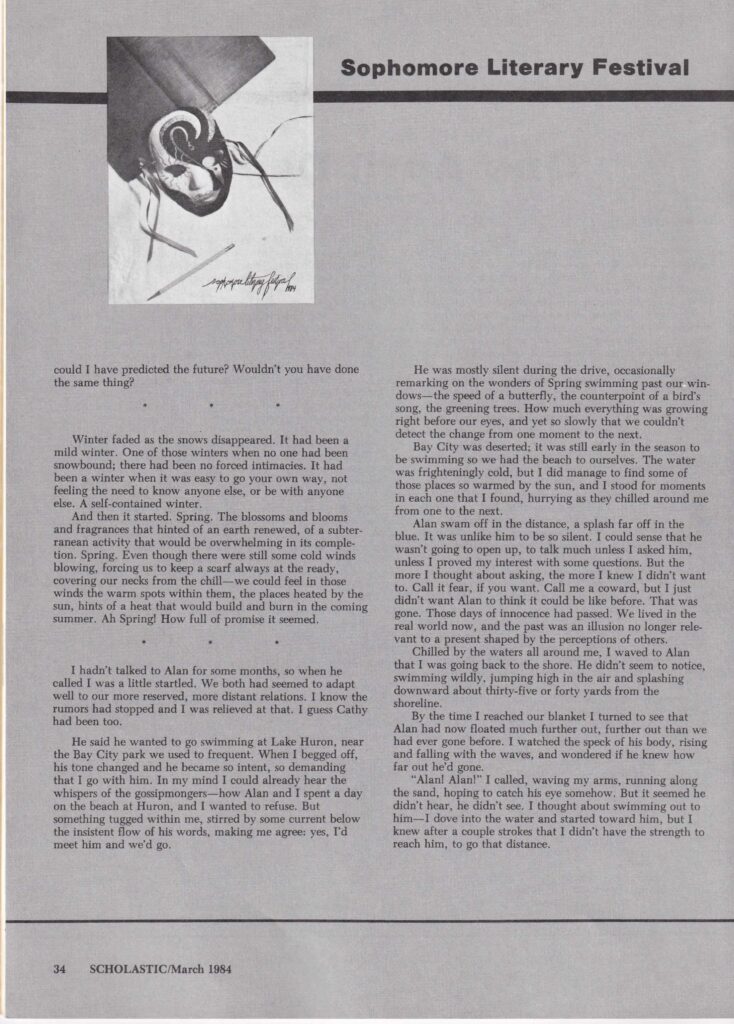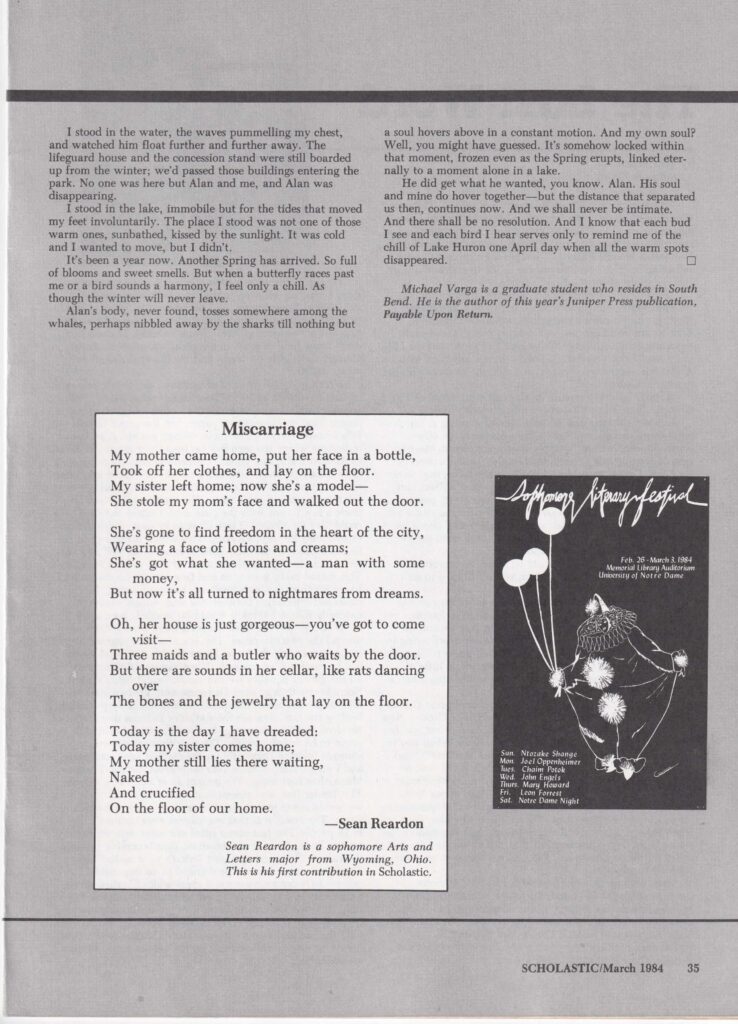A Short Story by Michael Varga
(Winner of the Sophomore Literary Festival at the University of Notre Dame in 1984; published in Scholastic Magazine in March 1984)
One of the great mysteries that mesmerized me as a child was wading through the ocean. Have you done that? Sure., ‘course you have. But that wasn’t the mystery: the intrigue was encountering those pools within the ocean, those places where the water was so much warmer. You’d move from a chilly wave into a space where the water seemed warm, heated even, by comparison with where you had been. And I’d stand in that pool and wonder how this one place, this point in the middle of the expanse of water cloaking the earth—how it could be different, so pleasant to stand in.
Alan used to say it was warmer ‘cause someone had just pissed there; and he’d swim away, laughing and pointing and calling me a “piss-o-phile.” But what a wonderful feeling it was. Knowing how cold the ocean was, and yet, here seemed a place set aside for someone to inhabit, someone to be warm, just standing.
I used to think that the place was just for me; but as soon as I would leave it, swim out twenty yards or so—when I’d look back at that space someone else would be there. Most times. Not every time, but just about every time.
Seems to me that life’s like that. Find a place you like, but you sense that it’s kind of stupid—with everyone else moving around you—to just stand there. So you move too, and once you do you find someone has taken your place.
I really didn’t expect that to happen with Alan. We’d been friends for so long that I couldn’t conceive of someone else usurping my place. Just taking it so easily. And Alan just acquiescing. I probably shouldn’t have said “usurp” ‘cause it was my idea to leave, so to speak. It just seemed so stupid standing still. Every day was the same: he and I would go to classes, and then meet for a drink at the Pub, get a bite together, study together. We were just too much together. It’s not like I loved him or anything, although he did say he loved me. But I just waved that off: I mean I couldn’t take him seriously when he said that. You know, you talk about standing still—well that kind of love is surely static. It doesn’t produce anything, does it?
So one day I said to Alan: “Don’t you think we spend too much time together?” And he said Cathy, his girlfriend at that time, had asked him the same thing. So I asked, “What did you say to Cathy, then?” And he said, “I didn’t say anything. I threw a glass of water in her face!”
“What? Were you drinking a glass of water at the time?”
“No. When she asked about you and me, something just made me get up and get some water from the kitchen. And when I came back, her glaring at me through all the silence, so obviously waiting for some sort of assuring answer, I just threw it in her face.”
I never understood Alan’s relationship to me. I mean, he had Cathy—she stayed with him even after getting splashed—but he seemed to want some intimacy with me as well. It wasn’t something physical he wanted; at least I never believed it to be so. But he used to talk like a mystic, a visionary, of our own souls hovering together.
He seemed to have this illusion that he and I were inextricably bound together forever. And almost as though we’d one day write each other’s biographies, we’d chronicle the events of our lives to each other, making notes while we talked, feverishly jotting down phrases that seemed to sum our feelings.
Alan was convinced we were capable of some great work, some accomplishment that others would honor as angels honor the Creator. His work no doubt would be literary—some epic transcending the petty concerns of mortal men; he used to joke about writing sequels to all of T.S. Eliot’s works. He’d already started “The Graced Land,” which he began “April is the coolest month…, playing off the slang use of “cool” as in hip, with-it, and all those other code phrases of our era.
It was never clear what my “great work” would be—after I failed to get a second invitation to the Detroit Tigers’ baseball camp (at the first I had been impressive in the field but miserable at the plate!), we ruled out a sports career. I have no great artistic bent, and although Alan would shush me when I would say it, I often thought my own life would be marked by a relatively blissful ordinariness, a sort of sequel to Philip Carey’s tale in Somerset Maugham’s Of Human Bondage—an embrace of the orthodox vision of how a man finds fulfillment: steady job, wife, children.
Alan would rarely let me articulate any of this, and when I’d hint of the “ordinary,” he’d say that was enough “honest plundering” for one day (that’s what he called these musings of ours, “honest plunderings”) and we’d go off and have a drink or go for a swim.
* *
And then it started. You know what happens. The rumors. People started talking about us. Although I wonder now if they hadn’t always talked and we had just been too oblivious to it to notice. And Alan seemed indifferent when I told him what people were saying. He said Cathy had already told him about it. I didn’t ask what he said to her—he was likely to have splashed her again.
“But doesn’t it bother you, Alan?”
“Why should it? We don’t have anything to feel guilty about, do we?”
“I know that Alan, but people’s perceptions can affect our…, well…. our ‘reality’.”
Alan could sense that I was succumbing, that I didn’t want my “reality” affected by these rumors. And that given a choice, well…. I stopped meeting Alan after class., and I changed my study schedule so that I rarely encountered him at all. When I did see him, it was always brief—especially if we were alone.
Sure, it’s easy to say now I was wrong to cut him off—but who knew what was going to happen? I mean, could I have predicted the future? Wouldn’t you have done the same thing?
* *
Winter faded as the snows disappeared. It had been a mild winter. One of those winters when no one had been snowbound; there had been no forced intimacies. It had been a winter when it was easy to go your own way, not feeling the need to know anyone else, or be with anyone else. A self-contained winter.
And then it started. Spring. The blossoms and blooms and fragrances that hinted of an earth renewed, of a subterranean activity that would be overwhelming in its completion. Spring. Even though there were some cold winds blowing, forcing us to keep a scarf always at the ready, covering our necks from the chill—we could feel in those winds the warm spots within them, the places heated by the sun, hints of a heat that would build and burn in the coming summer. Ah, Spring! How full of promise it seemed.
* *
I hadn’t talked to Alan in some months, so when he called I was a little startled. We both had seemed to adapt well to our more reserved, more distant relations. I know the rumors had stopped and I was relieved at that. I guess Cathy had been, too.
He said he wanted to go swimming at Lake Huron, near the Bay City park we used to frequent. When I begged off, his tone changed and he became so intent, so demanding that I go with him. In my mind I could already hear the whispers of the gossipmongers—how Alan and I spent a day at the beach at Huron, and I wanted to refuse. But something tugged within me, stirred by some current below the insistent flow of his words, making me agree: yes, I’d meet him and we’d go.
He was mostly silent during the drive, occasionally remarking on the wonders of Spring swimming past our windows—the speed of a butterfly, the counterpoint of a bird’s song, the greening trees. How much everything was growing right before our eyes, and yet so slowly that we couldn’t detect the change from one moment to the next.
Bay City was deserted; it was still early in the season to be swimming so we had the beach to ourselves. The water was frighteningly cold, but I did manage to find some of those places warmed by the sun, and I stood for moments in each one that I found, hurrying as they chilled around me from one to the next.
Alan swam off in the distance, a splash far off in the blue. It was unlike him to be so silent. I could sense that he wasn’t going to open up, to talk much unless I asked him, unless I proved my interest with some questions. But the more I thought about asking, the more I knew I didn’t want to. Call it fear, if you want. Call me a coward, but I just didn’t want Alan to think it could be like before. That was gone. Those days of innocence had passed. We lived in the real world now, and the past was an illusion no longer relevant to a present shaped by the perceptions of others.
Chilled by the waters all around me, I waved to Alan that I was going back to the shore. He didn’t seem to notice, swimming wildly, jumping high in the air and splashing downward about thirty-five or forty yards from the shoreline.
By the time I reached our blanket I turned to see that Alan had now floated much further out, further out than we had ever gone before. I watched the speck of his body, rising and falling with the waves, and wondered if he knew how far out he’d gone.
“Alan! Alan!” I called, waving my arms, running along the sand, hoping to catch his eye somehow. But it seemed he didn’t hear, he didn’t see. I thought about swimming out to him—I dove into the water and started toward him, but I knew after a couple of strokes that I didn’t have the strength to reach him, to go that distance.
I stood in the water, the waves pummeling my chest, and watched him float further and further away. The lifeguard house and the concession stand were still boarded up from the winter; we’d passed those buildings entering the park. No one was here but Alan and me, and Alan was disappearing.
I stood in the lake, immobile but for the tides that moved my feet involuntarily. The place I stood was not one of those warm ones, sunbathed, kissed by the sunlight. It was cold and I wanted to move, but I didn’t.
* *
It’s been a year now. Another Spring has arrived. So full of blooms and sweet smells. But when a butterfly races past me or a bird sounds a harmony, I feel only a chill. As though the winter will never leave.
Alan’s body, never found, tosses somewhere among the whales, perhaps nibbled away by the sharks till nothing but a soul hovers above in a constant motion. And my own soul? Well, you might have guessed. It’s somehow locked within that moment, frozen even as the Spring erupts, linked eternally to a moment alone in a lake.
He did get what he wanted, you know. Alan. His soul and mine do hover together—but the distance that separated us then, continues now. And we shall never be intimate. And there shall be no resolution. And I know that each bud I see and each bird I hear serves only to remind me of the chill of Lake Huron one April day when all the warm spots disappeared.




